By Rich Acritelli
“A nation that does not honor its heroes will not long endure.”
These words were stated by an American icon who guided this nation during one of the most tumultuous periods in our history. It was at this point on Veterans Day, 1864, that Lincoln won re-election against former commanding general of the Union military George B. McClellan. For many months, Lincoln feared that he would not win a second term and that his military forces would have to gain a decisive victory against the South before he left office in March of 1865. The president agonized over his personal estimation that he would eventually lose to McClellan and that the nation would not be preserved. His eventual victory signaled a continuation of the major task of the Union government to defeat the Confederacy and have the country be united under one flag.
Lincoln’s armies were led by the skill of General Ulysses S. Grant, who understood the importance of achieving military objectives towards the success of Lincoln being re-elected. Unlike Robert E. Lee who did not connect the strategy of the Army of Northern Virginia towards leadership directives of Jefferson Davis, Grant directed that his forces had to win battles to persuade northern voters that Lincoln was making enough progress to win the war. Once Grant took over the authority of all Union forces in March of 1864, he directed the bloody fighting in Virginia that resulted in a deadly struggle between these two armies.
At the start of the Overland Campaign in May of 1864, Grant informed Lincoln that there was no going backward against the Confederates. Every effort was put forth to pressure the southern forces that precariously held onto fortifications that guarded Richmond and Petersburg. Although the southerners defeated many of the commanding leaders from the Army of the Potomac, Lincoln had a bulldog in Grant who was not intimidated by the multitude of southern victories that were won by Lee.
Davis and Lee eagerly sought the political defeat of Lincoln, as they realized that if he gained a second term, this president would vigorously carry out the war until the North achieved victory. These key Confederate leaders worried about the lack of resources and the stretching of their own lines against the numerical strength of the northern soldiers. And in Georgia, Sherman left behind Atlanta in his “March to the Sea,” where he captured Savannah by Christmas as a gift to Lincoln. With a vengeance, Sherman marched through the Carolina’s to link up with Grant’s army in Virginia. Grant’s unwillingness to bend against the Confederates and the political and military wisdom of Lincoln, signified the beginning of the end for the Confederacy in early November of 1864.
During World War II in Europe and at this moment in time (originally called Armistice Day), Allied armies quickly operated from Normandy to move eastward into the interior of France. That summer was an extremely hazardous moment for the Germans, as they were driven back into Poland on the Eastern Front, in the West, and when Paris was liberated by General Dwight D. Eisenhower and his coalition of armies. Even as Operation Market Garden was deemed a failure with a waste of resources and men, the Allies waged massive air drops into Belgium, the Netherlands, and near the German border. This pursuit from the Atlantic and the Mediterranean Sea saw German military resistance almost collapse in this part of Europe that was held by the Nazis since the spring of 1940.
Like that of Lincoln, President Franklin D. Roosevelt faced a re-election, but this was for his unprecedented fourth term. Many Americans counted on the smile of Roosevelt and his guidance during the harrowing moments of this war. Although Lincoln was a dominant Republican and Roosevelt was one of the most capable Democratic Presidents to hold office, these leaders shared many similarities. With six months left of fighting their respective wars, both men were exhausted from the daily rigors of leadership and they aged beyond their years. They asked their populations to keep sacrificing for the good of the war, grieved over losses, and they were determined to gain a victory that would change both the nation and the world.
Both men are historic giants, but they were known for being major political figures within their states of Illinois and New York, respectively. They held secondary military positions, as Lincoln was a captain of his militia during the Black Hawk Indian War and Roosevelt was an Assistant Secretary of the Navy during World War I. To win their respective wars, Lincoln counted on the support of war time Democrats that served in the Union army as generals. When Roosevelt ran for re-election for his third term in 1940, he fully realized that America would eventually fight the Germans and Japanese. FDR asked for the support of noted Republicans Frank Knox as the Secretary of the Navy and Henry L. Stimson to command the War Department.
These historic families sacrificed like others in this country as Lincoln’s son Robert was a captain within Grant’s headquarters staff. Jimmy Roosevelt, the eldest son of FDR, was decorated for dangerous combat operations against the Japanese, and he ended the war as a colonel. They were well-liked figures that saw Lincoln present colorful stories and Roosevelt always wore a smile on his face during tense moments. While they were busy running the war, both leaders saw the importance of visiting their soldiers. At the end of the Civil War, a tired Lincoln was urged by Grant to spend time with his headquarters and soldiers at City Point, Virginia. Lincoln rode his horse close to the front lines with Grant and enjoyed the company of his officers and soldiers. In North Africa, Roosevelt sat in a jeep with his brilliant smile and openly talked to Eisenhower and General George S. Patton. Even at the cusp of total victory, Lincoln was at the service of Grant in helping him at every turn to defeat the Confederacy and end slavery in this country. Roosevelt was driven to destroy fascism as his armies were poised to enter Germany and General Douglas MacArthur prepared to stage his return to the Philippines.
When these leaders died, the American government, military, and civilians mourned over their loss. Citizens watched the trains that brought Lincoln to Springfield, Illinois and Roosevelt to Hyde Park, New York for their final burial. Americans from different walk’s life tried to gain a last glimpse of the coffins that were draped within an American flag. May this nation always thank the men and women that served in the armed forces within every conflict and those historic political leaders that put our people first during exceedingly trying times.
Rich Acritelli is a social studies teacher at Rocky Point High School and an adjunct professor of American history at Suffolk County Community College.







